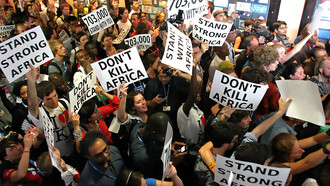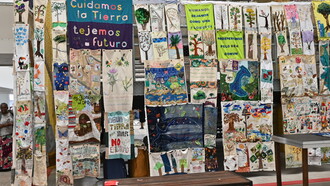The very acronym BRICS: Brazil, India, China, Russia, and South Africa, a bloc of countries that joined in 2001 and formed a partnership following the creation of the term by Jim O'Neil of Goldman Sachs Economics (first it didn't include South Africa) and identified the fast-growing BRICS economic powers that would emerge as dominant global players by the year 2050. And concluded that these four countries would determine the direction of the world economy and politics in the XXI century. The organization seeks to deepen economic cooperation between the member countries and stands in contrast to the Western sphere of power.
The BRICS grouping includes countries with diverse political systems, economic models, and cultural backgrounds; it even includes geopolitical rivals. They have established the Parliamentary Forum, which is responsible for inter-parliamentary exchanges, consultations, and the development of new mechanisms for inter-parliamentary cooperation. BRICS nations are forecasted to grow more quickly than the most advanced global economies (Group 7). The countries act as a counterbalance to traditional Western influence. The BRICS association is an intergovernmental organization composing Brazil, China, India, Russia, and South Africa, which, according to the decision adopted by the 15th BRICS Summit in August 2022 in Johannesburg, included Egypt, Ethiopia, Iran, Saudi Arabia, and the United Arab Emirates as new full members, which is a strong indication of the growing authority of the association and its role in international affairs.
BRICS is actually an alliance of the world's majority connected by the common desire to end Western hegemony in every sphere. BRICS is not even linked by ideology or common religion. The BRICS countries were connected by a common interest and a common desire for liberation from Western imperialism, which touches every country on the planet and has become an enemy of man and humanity. Western hegemony is the enemy of its own population. The BRICS alliance is attracting new members who want to join the bloc and ditch the US dollar for trade. These nations are eager to break free from the clutches of the US dollar and make either their local currencies or even Bitcoin the legal tender for cross-border transactions.
BRICS launched the intra-bank system and financial system integration. Less reliance on the US dollar means fewer initiations of wars, fewer sanctions, and less growth for the majority of countries. There are some similarities in the interests of the BRICS members but also considerable divergences, and there are some existing conflicts (between China and India, between Egypt and Ethiopia, and between Iran and Saudi Arabia), and the BRICS organization has not agreed to develop solutions. It will be a difficult and slow process to implement monetary policy for such geographically, economically, and politically diverse players as the BRICS group. Membership in the BRICS group makes it easier to circumvent Western economic and political sanctions.
The BRICS group now comprises almost 46 percent of the world's population. The impact of BRICS countries on the global economy is almost 36% of the world's GDP, 25% of global trade, and 23% of foreign direct investment. BRICS countries have immense deposits of natural resources, and new BRICS members have a well-established presence in many regional alliances (ASEAN, OPEC), thus giving BRICS greater influence and penetration in regional affairs at all levels. With the BRICS fostering a non-USD economy, the far-reaching economic trend can significantly weaken the USA. BRICS brought hope for better economic prospects for Africa, Asia, and Latin America. The rapid BRICS growth and its influence in the global economy have enabled the bloc to reshape international trade, finance, and investment domains that used to be monopolized by the USA and Western countries. The aim of BRICS is to become more independent of the dominant role of the Western financial and capital markets. All the BRICS states have an interest in being strongly represented as political and economic middlemen and superpowers in global multilateral organizations (UN, IMF, World Bank).
The central banks of the majority of developing countries are now diversifying their allocations with gold and other local currencies. The world reserves in the US dollar are falling as central banks are looking at ways to end dependency on the currency. They established alternative structures such as the New Development Bank to provide funding for emerging markets and developing countries in infrastructure and sustainable development projects. By 2023, the New Development Bank and Asian Infrastructure and Investment Bank combined had committed more than $75 billion in credit across infrastructure, public health, and clean energy, and this project generated significant revenue for BRICS companies.
The New Development Bank and member states seek to build economic cooperation between the nations, to depend on each other, and to build a growing influence in the world. BRICS members collectively contribute a substantial portion of global GDP. These nations exert influence in international financial institutes and negotiate more favorable terms in trade agreements. The share of global trade in goods translated among the group's members more than doubled from 2022. Within the BRICS group was the agreement to settle trade in their own currencies in the future. And as China is the largest trading partner of all BRICS countries, international payments will potentially be made in Chinese Yuan (also known as renminbi) rather than in US dollars.
The key advantages of the BRICS ETF (exchanged traded fund) are access to fast-growing economies, diversification, and the possibility of generating higher long-term returns than developed markets. The growing BRICS gives emerging markets the opportunity to align on global topics and new economic opportunities. Countries want to join BRIKS to foster economic cooperation with peer emerging economies, such as in trade and investment. A larger BRICS challenge is the dominance of existing global institutions such as the International Monetary Fund and World Bank that are strongly influenced by the West countries. The BRICS nations are engaged with advanced economies and with China, which is perceived as an economic and trade superpower, to create another coalition less dependent on the West. BRICS countries and economies are relying increasingly on trade with each other, and these economies are growing rapidly.
Brazil, the South American giant, wants a bigger say in global affairs. With over 200 million people and vibrant democracy, Brazil has an interest in keeping the BRICS and to emphasize its preference for a more limited membership, while China and Russia welcome more like-minded partners to join the BRICS. The Brazil President Lula de Silva wants a small BRICS made up of big countries, which would enable Brazil to preserve the special kind of relationship it enjoys through BRICS with major global players. Lula said that they want to change because of the UN Security Council, whose permanent countries have launched unprovoked attacks on sovereign nations in flagrant violation of international law, and because of the climate question: if the UN decisions are not mandatory, countries don't do it. And they still haven't implemented the Kyoto protocol. In its long standing foreign policy Brazil will not choose sides in international disputes in which it is not directly involved.
China dominates BRICS and is the strongest economically. China wants its policy, and especially the acceleration of its development, to benefit the rest of the world, which is a completely new doctrine in international relations. China offers the concept of mutually beneficial cooperation and the idea that capital serves society and not a society capital. Xi Jinping says that the world should build a common future and create a world that is truly shared by all. China is willing to share scientific knowledge and achievements with other countries and must accelerate its development to keep up economically with its global challengers.
China sees the BRICS group as a kind of 'insurance policy,' and China remains on a confrontational course towards the USA and the West because of the escalating conflict with the US in the Taiwan Strait. China wants to become less dependent on the US dollar and American clearing payment systems (SWIFT) and has already established its own system for international payment transactions, the Cross-Border Interbank Payment System (CIPS). China wants to be the leading voice for the global south and to grow its power and influence through BRICS in Africa. China certainly presents the most potential superpower and a rising economic and military superpower.
India is a member of BRICS since its funding in 2008. To the surprise of many, India is currently the fastest-growing economy in the world, which could surpass the U.S. and even China by 2030. Today India is a leading force in demography and the IT sector, and the Indian diaspora controls a significant part of Silicon Valley. India owes its new success mainly to the turn in politics and the coming to power of the conservative Bharatiya Janata Party (Indian Peoples Party), the leading party in the country. BJP is based on the project of Great India; never before has there existed such a large unified country as Modern India.
India has never been an ally of the United States; it is not interested in American unipolarity but seeks to rise as a great and powerful power in a multipolar world. India confronts the United States and its allies when it is necessary. Narendra Modi and Indian traditionalists stand for the 'decolonization of the Indian mind, which involves the struggle against Western civilization. The new Indian government will have to cooperate with China, with which it shares traditional deep-rooted antagonisms, and will remain a strategic partner of Russia because such cooperation is beneficial for both countries. The Modi government's policy of'multi-alignment' is characterized by participation in various forums and also reflected in India's role as a bridge builder to the West within BRICS. India is a close partner of the USA, Australia, and Japan in the Indo-Pacific region and aims to limit China's growing influence in the region.
The key features of Russia's long-term foreign policy are: cooperation within the BRICS group interaction with the association's members that meet the fundamental national interests of the country with a systematic policy of forming a fair multipolar world order and creating equal opportunities for all countries to develop. President V. Putin also mentioned the development of economic partnership, cooperation in science and innovation, security and counter-terrorism, culture, and sports.
Russia will focus on three key tracks—politics, security and finances, cultural and humanitarian ties—all under the common 'Strengthening Multilateralism for Equitable Global Development and Security'. BRICS is helping Russia to overcome the sanctions imposed from the West after the invasion of Ukraine. Russia, on the other hand, is seeking to open up new sources of sales (natural gas and oil) following the loss of the European market. Russia gained China and India as significant customers. More important to Russia than sales policy in the geopolitical competition is that the BRICS become the antithesis of the West as the advocate of the 'Global South'. Moscow will host the 6th International Municipal BRICS Forum on 27-28 August 2024. The BRICS officials will discuss the climate agenda on 29-30 August in Moscow.
South Africa is the strongest economy in Sub-Saharan Africa. South Africa joined the alliance in 2010. The country hopes that its closer links to important global players will promote the continent's development due to its growing consumer markets and abundant raw materials. The meeting of the BRICS states in 2013 in Durban was held under the motto 'BRICS and Africa: Partnership to Integration and Industrialization'. And in the context of the BRICS Summit in 2023 in Johannesburg,'multipolarism' was the important goal. South Africa's government sees itself as a pioneer in Africa, and it reached milestones in its endeavor with the accession of Egypt and Ethiopia.
Iran, Saudi Arabia, the UAE, Indonesia, and more than 30 other countries that want to join the BRICS alliance and position themselves in a geopolitical competition as a counterweight in the Western-dominated political systems. And we hope that a partnership with the BRICS countries will lead to greater investment and technology expertise in the areas of energy, infrastructure development, and access to new markets. Countries within the BRICS group and other Global South Nations have voiced growing dissatisfaction with the United Nations, citing several key issues, among which is the undue influence of Western organizations and decision-making bodies.
The current UN structure does not adequately reflect their interests or perspectives, leading to calls for a more democratic and inclusive approach. BRICS leaders highlighted the need for comprehensive reforms within the UN, emphasizing the importance of enhancing the participation of emerging nations, reevaluating the Security Council's composition, reconsidering veto power, and strengthening regional organizations. Purpose changes are with the goal of establishing a more equitable and representative system of global governance. These countries forge new paths, creating opportunities for all. BRICS conducts an active transformation of the global economic landscape. The global significance of the BRICS group is likely to increase in the future.















